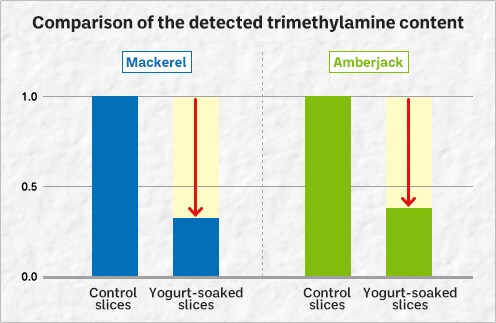
Yogurt × fish

We conducted an experiment to see how effectively yogurt can remove fishy smells in cooking.
DHA and EPA are known to prevent lifestyle diseases, and the government recommends taking in at least 1 g per day, or about 90 g or more per day in terms of fish weight*.
We ran an experiment to see how effectively yogurt can mask the fish smell in cooking, hoping to increase the consumption of fish that are rich in these essential nutrients.
*Source: Dietary Reference Intakes for Japanese (2010), Ministry of Health, Labour and Welfare.
Cause: The main compound that is responsible for the fish smell is trimethylamine.
The compound found in fish that is responsible for the typical fish smell is an alkaline chemical compound called “trimethylamine.” In high concentrations, trimethylamine gives off such a strong ammonia-like odor that it’s on the list of controlled substances under the Offensive Odor Control Act. Research has shown that it occurs due to the breakdown of certain compounds in fish meat, and is used as an indicator of fish’s freshness.
We tested yogurt’s ability to neutralize the fish smell using the amount of trimethylamine as a reference.
Experiment started: Mackerel and amberjack were soaked in yogurt and heated.
We prepared the following four specimens to test and compare in this experiment.
■Mackerel
・Control slices
・Experimental slices soaked in Bulgaria Yogurt LB81 Plain
(Ratio between fish and yogurt = 3:5)
■Amberjack
・Control slices
・Experimental slices soaked in Bulgaria Yogurt LB81 Plain
(Ratio between fish and yogurt = 3:5)
All specimens were placed in plastic bags and kept in a refrigerator overnight at 4℃.
Then they were taken out of the refrigerator the next morning, and were cooked on the fish grill inside a gas stove. The mackerels were grilled on the skin side for five minutes, and were then flipped over to grill the other side for two minutes. The amberjacks were grilled on the skin side for five minutes, and were then flipped over to grill the other side until a good amount of browning was achieved.
Analysis: The specimens were prepared to achieve proper evenness and their trimethylamine content was compared.
Then we removed the skin and all scorched parts from the grilled specimens, put them in food wrap, and tapped them with a stick to make the meat soft and flaky.
After achieving evenness among all the specimens, 0.5 g of meat was sampled from each specimen and the trimethylamine content was compared.
The comparison revealed that, relative to the content of the control specimens not soaked in yogurt as 1, the trimethylamine content of the mackerel and the amberjack that were soaked in yogurt was 0.3 and 0.4, respectively.

*Data obtained by Meiji Co., Ltd.
Conclusion: Soaking fish in yogurt reduced their amounts of fish-odor compound.
Soaking the fish in yogurt clearly reduced their trimethylamine content, an indicator of fish smell.
As trimethylamine is alkaline, it is inferred that the compound was reduced by adsorption to the yogurt, which is acidic.
Thus, soaking fish in yogurt is an effective way to get rid of the fish smell and make it more palatable.
If your family members do not like eating fish, try soaking it in yogurt before cooking.
The EPA and DHA found in fish are essential nutrients for preventing arteriosclerosis and cardiovascular disease, and aiding the development of the brain and nerves and maintaining their functions, respectively.
So, it’s worth adding just one extra step to cooking to increase the amounts of those crucial nutrients for better health.
















